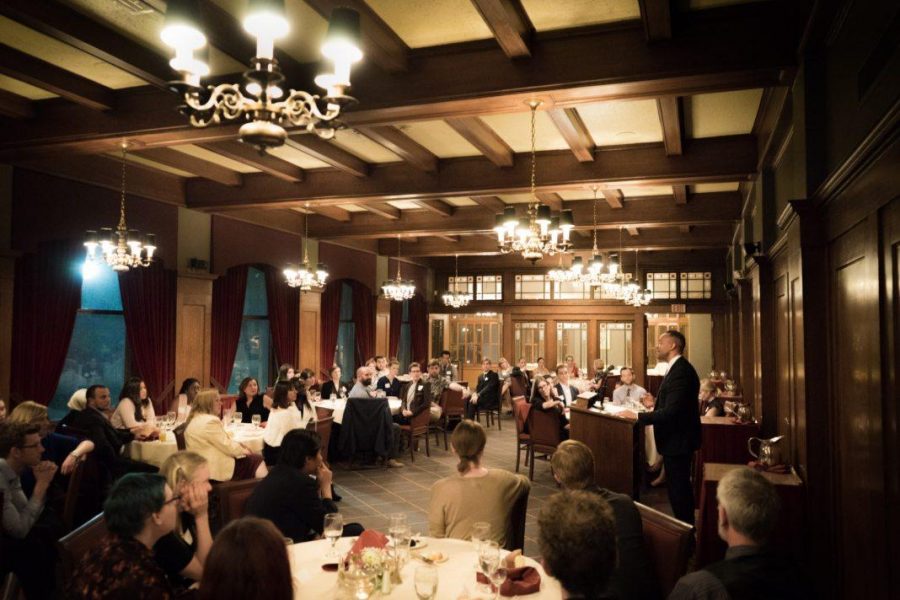The My “U” Signature Experience (MUSE) Project aims to help undergraduate students succeed by offering career and social opportunities, as well as inspiring keynote speakers. People from all majors and backgrounds meet together at MUSE events to form a community, and this year’s MUSE theme is empowerment.
“All students come with a unique constellation of gifts, and we create a culture for them to develop those talents and to be empowered by developing them,” said MUSE director Mark Matheson.
Coming Together
All students at the University of Utah are welcome to attend MUSE events. The program, which boasts over 700 scholars, facilitates on-campus internships and involves over 40 professors in enhancing students’ undergraduate experiences. The program connects them both with each other and with mentors within the U community.
MUSE holds Lunchtime Lectures at 12:15 p.m. on the first Thursday of each month and Casual Friday conversations every week from 10-11 a.m. These gatherings are meant to foster discussions on a variety of topics.
In February, MUSE professor Matt Haber lectured on the philosophy of science. He wants to bridge the gap between the hard sciences and philosophy. The audience’s questions led to a discussion of ethics and artificial intelligence. At the end of the conversation, attendees concluded computer scientists need to collaborate with ethicists to ensure that the development of artificial intelligence is ethical.
Ryan Holbrook, who is a MUSE scholar and intern, described the meetings as “a lot of different people getting together. It’s great to have a dance major, an engineering major, a sociology major and other different majors all talking about the same thing.”
“MUSE does a terrific job of connecting you to mentors, research opportunities and to expose you to many opportunities,” Holbrook said. “Being in the workforce exposes you to many kinds of people and backgrounds and MUSE prepares you for that.”
Connecting
Since its inception six years ago, MUSE has been connecting students to internships on campus. Most of the time, a department on campus will contact MUSE about available internships and they typically have a student in mind for the job. Students can also ask for MUSE’s help in finding a department on campus to intern for. In some cases, these opportunities can turn into a job for the student or provide experience in the field they are studying. All of the internships are located on campus.
“It mobilizes teaching potential and is all educational,” Matheson said.
MUSE comes with a large package of resources to help students prepare for a career.
“It’s a mix of practical experience and great opportunities to look at the big picture and explore how organizations evolve,” Holbrook said of his time as a MUSE intern.
Holbrook is majoring in English and may pursue a minor in economics. He aims to have a diverse background and hopes to eventually attend law school. Through MUSE, Holbrook was able to have a hands-on approach to his career and gained skills that apply to real-life situations.
“I had the opportunity to meet and interact with people that I wouldn’t have otherwise,” Holbrook said. “It allows you to be exposed to so many things.”
Through MUSE, he was able to meet another student who he ended up collaborating with to create a product that is now funded by the U’s Lassonde Entrepreneur Institute.
“I was exposed to someone from a very different background than me,” Holbrook said. “It was a fresh perspective — it helped innovation happen.”
MUSE professors also work to bolster student success as they attempt to further a culture of mentoring at the U. They help to build a network of people. They meet with undergraduate students at regular MUSE events, deliver many of the Lunchtime Lectures and gather with MUSE Scholars for special occasions. Beyond these professors, MUSE aims to introduce students to people who care about student success — professors, leaders in the community and national guests.
Inspiring
The book students are reading for this year’s theme is “Hidden Figures” by Margot Lee Shetterly. MUSE chose this book because the women in the story embody professional and personal empowerment.
Shetterly will speak at the U on March 30 at 12 p.m. at Kingsbury Hall with Ellen Stofan, a former chief scientist at NASA. The goal is for students to see these women and realize that no matter the barriers they face, they can have a successful career.
“MUSE brings in a lot of big keynote speakers to show that what they’ve accomplished is reachable for our own remarkable students,” Matheson said. “It shows students that they are a part of that world, and they can talk with extraordinary people.”
Another speaker MUSE is hosting is Knatokie Ford, a former White House Senior Policy Advisor on Science and Technology. She will speak about imposter syndrome and how it affects students. Inviting Ford is “part of that fundamental emphasis for students to develop their own gifts,” Matheson said.
One of MUSE’s concerns is students often feel as if they do not deserve the success they have achieved and are frauds. By having Ford present, MUSE hopes students will be able to combat these emotions by knowing they are not alone and their feelings are shared by many successful individuals.
Through speakers, internships and meetings, MUSE aims to foster student empowerment and student involvement is encouraged.
“There [are] no obligations, just benefits,” Matheson said.
Information about how to get involved with MUSE is available on its website, muse.utah.edu, and at its physical location in the Sill Center. In the end, its goal is to empower students and give them the tools they need to succeed in their careers.
“We want to help students find and strengthen their gifts,” Matheson said. “MUSE is a source of inspiration. We want to inspire students by what they’re capable of doing. Education opportunities empower them.”
@TheChrony


